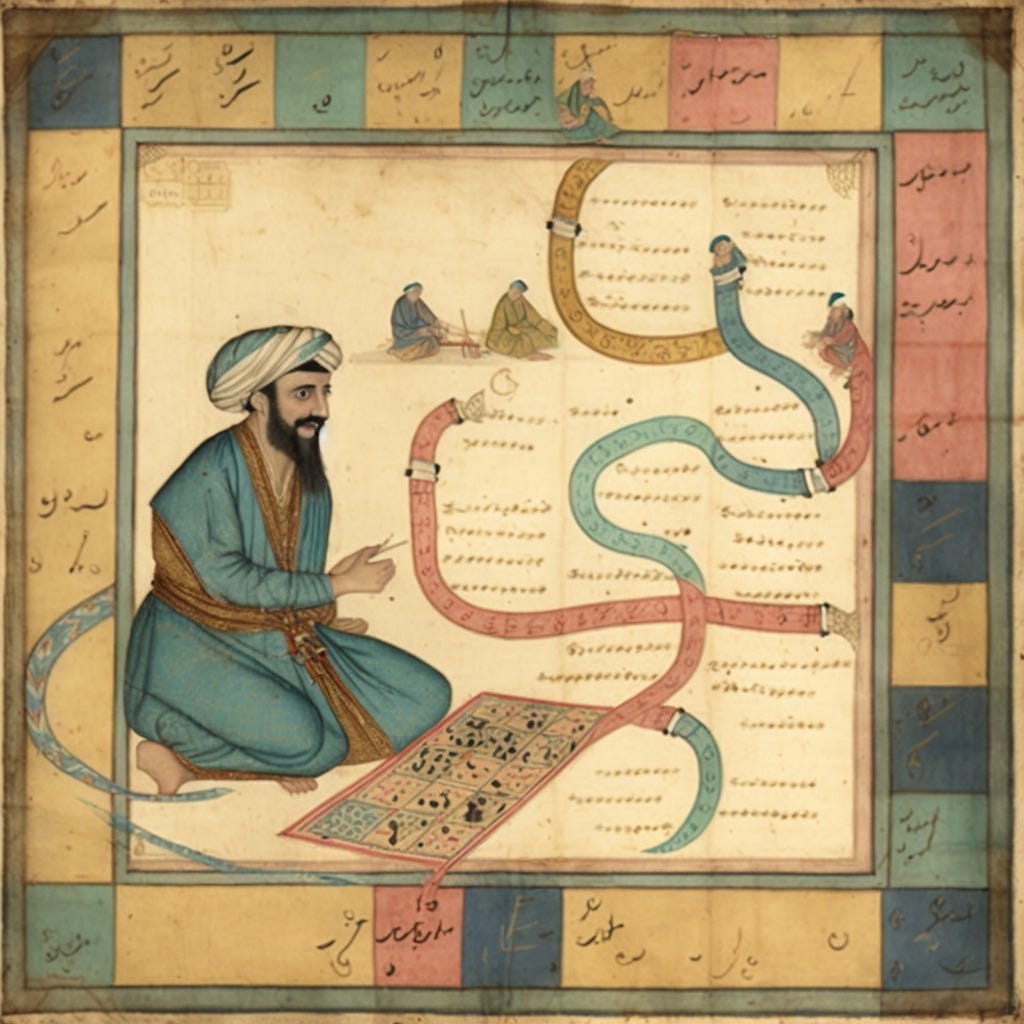If you’re joining us just now, follow the snake’s tail to the Prologue or climb a ladder to the Table of Contents.
Chapter 6: The Canadian Colony of Norway
Evan was again ascending the escalator on the Astral Plane. The opalescent light filtering through the gray clouds discovered that now-familiar skyscape of coiling snakes and ladders. Elevator music (“Up-up and Away” by the Fifth Dimension) was issuing from crackling speakers. This seemed appropriate since the escalator kept transforming into an elevator and then back into an escalator again.
He was glad he hadn’t had to climb an actual ladder as of yet, because that would’ve been annoying as Fu—
—And the instant he thought this, he was climbing a rickety-ass aluminum ladder.
“Son-of-a-bitch,” he grumbled.
The inert singularity was talking to him again: “You have to be careful what you think about in your dreams, because the things you think about might come true—or at least true in dreamland.”
Evan considered what the singularity had just said. Then he imagined himself on an escalator, and—bam!—he was back on an escalator again, grinning smugly and nodding to himself.
But the step Evan was on suddenly slammed shut with all the suddenness of a spy villain’s “you have failed me” push-button trap.—Sidelong he fell down the serpent’s steely scales, slip-sliding down its quivering redundancy. And no matter how fast he fell he never lost contact with the slick metal surface. Corkscrewing down the snake’s tail, he thought this was pretty awesome. His backside was joined to the creature’s spine. The serpent reared up and looked down at Evan. It grinned, licking the thin air in ecstasy.—And Evan hoped he wasn’t pleasuring the snake, because that would be creepy (even if it were just a dream).
Evan landed in a sturdy chair at an oak table in the reading room of the ancient university library in the Canadian Colony of Norway. He was wearing a scholar’s gown and round glasses. He removed the glasses but couldn’t see anything without them on; just a vague fuzziness.
“What?!” he shouted. He put the glasses back on and groaned. “I have to wear these things?”
“Yes,” the singularity said.
“This sucks big old donkey dongs,” he said, scowling. “They hurt my ears.”
Evan looked around the interior of the library, which was pervaded by a luminous blue mist. The building had burned to the ground in 1983 but had been completely restored last week with funding from UNESCO. Evan noticed that the original woodwork, which had somehow survived the fire, was cracked and water-damaged. Niyati was somewhere close by because Evan smelled her pheromones. This excited him and his loins stirred under his scholar’s gown as his unconscious body shifted in the airplane seat.
He had evidently not only fallen down the snake’s tail but through the Looking Glass. This had to be an alternate reality, because there was no such place as the Canadian Colony of Norway on the planet Earth where the sun rises in the west.
Evan was taken aback because the librarian was bearing down on him and yelling at the top of her lungs. Her silver hair was tied up. Her skin was withered and papery. She wore a brooch around her neck and had a hatchet face. She looked intentionally Dickensian. She spoke with a Scandinavian accent that Evan had a hard time understanding until the singularity explained to him that she was speaking Norwegian.
The librarian turned to the singularity, since Evan couldn’t understand her, and explained that she couldn’t speak English, because she had taken a vow as a child never to learn French or English, since these were the languages of the Canadian oppressors. She told the singularity with great urgency that the reason she had snapped at Evan was because the boy had made a ruckus when he’d fallen from the painted ceiling. And then she pointed to the faded plafond overhead.
Evan looked up and admired its intricacy. The Renaissance painting depicted both the Last Judgement and the Fall of Man, but in a way that implied that the one happened around the same time as the other. There was a strawberry field filled with snakes and ladders. Naked people were doing extremely demure, chaste, and pious things, but they were doing them wantonly. There were angels, demons, the Devil and a very angry Jehovah presiding over the whole scene with a dove coming out of his gaping mouth. A bored Jesus in a loincloth stood under the dove.
The Tree of Life was the focus of the painting. Eve was offering Adam an apple; and the Serpent, coiled around the trunk, was whispering into her ear. Naked homunculi, shriveled infants with adult heads representing the Sons of Adam, rode down the Serpent’s tail as if it were a curly slide. They fell into cauldrons of boiling pitch under the tree’s roots. But there were ladders rising out of the cauldrons that led back up to the top of the tree. The homunculi were climbing the ladders with the assistance of the angels and the demons, who were baptizing them into their new lives, tearing their admission tickets, and advising them to mind and watch their steps as they made their way back up to Heaven.
Evan told the singularity to tell the librarian that he had fallen into the library on the back of that snake over there next to the demon with a cat’s face holding a pitchfork.—“Yes, that one!” Evan clarified. “The snake shaped like a letter ‘S’. . . Does the Norwegian language have an ‘S’ in it?” The singularity confirmed that it did.
But the librarian was not listening to them. She was emotional because she was thinking of how beautiful the ceiling had been before the fire had destroyed it. She spoke in a tense voice that was positively dripping with irony and disdain. She told of how the UNESCO artist who had been commissioned to restore the ceiling had done a passable job i det hele tatt (“on the whole”), but that he had somehow managed to fuck up the face of the Angel Gabriel and make him look like a two-bit bottle-blonde tart.
Evan and the singularity had to admit that the excessive rouge and smeared mascara on the face of the Archangel Gabriel was hideous and unflattering. Ignoring them, the librarian went on to say that when the UNESCO board of governors learned that the artist (“kunstner”)—and she rolled her eyes when she said kunstner—had taught himself the rudiments of painting in a greasy-spoon diner on the Astral Plane two hours before the restoration work was scheduled to begin, several members of board were forced to resign.
“It was a scandal,” she said. “But the damage has been done.”—And she waved her hand at the ceiling and repeated “the damage has been done.”
The singularity comforted the librarian and spoke soothingly to her, patting her shoulder which she didn’t seem to mind. Her disposition softened, because she respected the inert singularity, who was an old man and a well-known scholar whose paperback self-help books she had read cover-to-cover, because his philosophy of optimistic pessimism had really spoken to her. And though the librarian didn’t think highly of the young whippersnapper in chic glasses whose name she could barely pronounce, the boy was apparently friends with the singularity (with whom she had fallen in love).—And this made Evan “alright in her book,” which she told the singularity, and, after the singularity had translated this, Evan told her that for a librarian to say that someone was “alright in her book” was actually kinda funny.
The librarian waited for the singularity to interpret, and, when she learned what Evan had said, she changed her opinion of him, because he had not thought of her as a Jungian archetype in his dream, but as an actual living and feeling entity. And now she was upset because she knew Evan’s fate. She asked the singularity if the boy was aware of what was in store for him. The singularity told her that Evan would learn all of these things in due time; and then he gently scolded the librarian, telling her that Evan’s fate was not nearly as bleak as she seemed to think it was.
The librarian went to fetch the book Evan was fated to read in the university library in the Canadian Colony of Norway. The book landed on the table in front of him with a booming thud that caused the dust to rise from the dustless floor. The pages were bound in iron.
There was a chain that extended from the book’s spine to the galleries on the second floor where it had been fetched from. Someone was tugging the chain from upstairs and making ridiculously ominous noises, like an adolescent trying to sound like a ghost. Evan found the tugging fun and playful and was not at all annoyed by the sophomoric gag, but it ceased immediately when the librarian cleared her throat and told the chain-tugger to stop because this was a place of learning.—At least that’s what the singularity told Evan the librarian had said.
Madame Blavatsky, the librarian’s assistant, glowered at Evan from the front desk near the door.
Evan opened the iron-bound book and magic tendrils of light rose from the title page, because the book had been waiting a long time to do this.
The book was a history of the ancient board game Snakes and Ladders. The first thing Evan did was skim through the pages of the book to admire the pictures. There were reproductions of old game boards with captions specifying the museum or archive where the relics were currently housed. The author had included a photograph of the version of the game his father had given to him when he was a boy: tan and orange squares, bright-eyed snakes, yellow plastic die cup. The caption under the picture said “from the author’s private collection,” which made Evan sniff derisively, since the photograph was so shitty that it was obvious the game board hadn’t been “on display” in a museum.
One of the game boards from the Mughal period was painted on lacquered wood. It depicted Islamic prophets with veiled faces pointing to each Sirat al-Mustaqim (“The True Path”), which was what the ladders leading up were called. Instead of snakes, there were fiery pits with jinn standing next to them, tempting the unwary to damnation. For a moment, Evan thought about that word “jinn”. It was homophonous with “gin”, which was not only a classical English word for a snare but a delicious drink, and he wished he had a gin and tonic right now.—“But that would be a gin (snare) for you,” the singularity remarked. “And besides, alcohol is proscribed in Islam, so you couldn’t drink while playing on this game board.”
“I know,” Evan remarked rather testily, “alcohol is haram (forbidden) in Islam, despite the word ‘alcohol’ being an Arabic alchemical term. In fact, ‘alchemical’ itself is Arabic. . . You seem to have forgotten that I took my degree in Oriental Languages.”
There was a version of the Snakes and Ladders game from the period of the Raj. And in each of the one hundred squares of the 10x10 grid, there were “stiff upper lip” British maxims in minuscule print. The edge of this game board was decorated with elephant guns, monkeys, liana vines. And at the top of the board Rikki-Tikki-Tavi was slaying the cobra Nagaina, while at the bottom a lily-white memsahib was being borne through the streets of Calcutta on a billowy palanquin.
Some of the boards depicted ropes, arrows, tunnels, or slides in lieu of snakes. There were too many illustrations, so Evan went back to the first page of the book and started reading it from the beginning.
For some reason he was intellectually curious and able to comprehend obscure scholarly things that he had never known before.
The glasses must be making me smart, he thought.
He was trying to remember where he’d studied Oriental Languages. Surely not in the Canadian Colony of Norway. After all, he didn’t know Norwegian.—Oh, now he remembered. He had received his doctorate from the University of Uppsala, because he was fluent in Swedish.
Evan skimmed the first few pages of the introduction where the author thanked colleagues by name for reading sections of the manuscript in draft and providing frank and valuable criticism that had prevented him from making embarrassing blunders (“. . . and any errors that remain are purely my own”).
He should’ve put all that in an acknowledgements section at the end of the book.
Then the author thanked Janet, the office secretary, for typing up the manuscript and for “advising” him not to use so many “hifalutin” words (and he italicized hifalutin), and Evan wondered if poor harassed Janet with her bad perm and shoulder pads realized the author was being a condescending dickhead when he’d said those things about her.
Of course, the author thanked his wife, “my rock, Susan, without whose support this journey would never have been possible.” And Evan mumbled “Jesus Christ: this journey”—like it was some goddamned Vedantic spiritual odyssey. But then maybe it was. Maybe this book was the crowning achievement of this trifling man’s short life and pathetic career. Evan’s conscience was pricked because he remembered Levi’s kindness and empathy for others. So he tried to emulate this and be more accepting of this fellow scholar’s work.
—But he had a hunch and flipped to the end of the introduction and it was just as he’d suspected. There was the author’s pompous “signature” stamped out in a 12-point serif font. And what really chapped Evan’s ass was this: the author had written three initials (L.J.C.)—three—in front of his last name (McSassy) as if he were a Nobel Laureate or some fucking peer of the realm. But the cherry on the cake of it all was that the very last line, immediately under the expansive list of titles and honorifics (PhD, LLD, DDS, CBE, OBGYN), the author claimed that he had written the introduction “In the Seychelles, April 1972.” Evan wondered if the author had actually written the introduction in the Seychelles, or if he had merely gone there on vacation with his rock, Susan, and thought it would make him sound adventurous and independently wealthy if he “posted” the intro from some far-flung exotic location like the Seychelles.
But it occurred to Evan that he was in an alternate reality, where the Canadians had apparently colonized Norway but where the sun also rose in the west and set in the east. So maybe the Seychelles in this universe had venerable libraries and academic institutions scattered all over its archipelago. Perhaps each island was spangled with cocktail huts and tiki bars to attract celebrity scholars. Maybe research assistants were granted special vouchers to take seaplanes to the bamboo archives nestled deep in the humid mist-wreathed papaya groves, where they verified their sources and edited their professors’ galley proofs. Perhaps the beaches were strewn with sunken reading carrels in the white sands, so that when lecturers needed a break, they could wade into the limpid blue saltwater and draw inspiration from the landscape, studying the flaming coral, collecting shells and starfish, communing with the sea turtles crawling ashore to spawn.
Evan was searching for a clue as to why he was here in the university library in the Canadian Colony of Norway, and he realized that the answer must lay hidden in this beefy tome. So he went back to page xxxiv of the introduction and reread the paragraph he’d left off from. He had to admit that, even though the writer was a self-absorbed jackass, he did a great job presenting the material and setting the scene.
Evan said “well, that’s interesting” when he read the passage about how, in ancient times when a playing piece landed on a snake’s head, this had signified that the piece had been swallowed by the snake, digested, and then shot out of the serpent’s anus.
Evan wondered why this information was in the book’s introduction instead of in a later chapter—or in some footnote, endnote, or appendix. It was another reason Evan despised the author. Putting smut like this in the introduction of an academic book published by a university press demonstrated a complete lack of breeding on the part of the writer. The sicko had obviously been eager (nay, horny) to inseminate the virginal introductory pages of his book with this disgusting image, realizing that only the most determined and dedicated reader would’ve discovered it had it been banished to some later section. It was a gimmicky thing to do, an obvious attempt to shock the reader and spur him (or her) to sit upright, grimace, and say “Eww!”
But now Evan had a second thought. What if it was the publisher who had advised the author to do this, thinking it would boost sales and appeal to a younger generation of academicians who were fond of scatological references and fart jokes in the scholarship.—Evan gasped and wondered if he had fallen victim to this subtle ploy. Perhaps his unshakeable fixation on the fecal imagery of Snakes and Ladders was at some deep psychological level part of the game, a test, a metaphorical backsliding down the serpent’s tail—or (in this case) a trip down its gullet and into its bowels.
The image was too terrible, too revolting, to dwell upon.
Evan pushed the book across the table and leaned back in his chair in the reading room of the university library in the Canadian Colony of Norway and thought about the metaphysical symbolism of shitting snakes. As he pondered these mysteries, he removed his glasses and massaged the bridge of his nose. He suddenly realized that he was grateful that the author had inserted this bit of learned lumber in an earlier part of the book, because Evan would otherwise have missed it, since he wouldn’t have time to read all 25,800 pages of the book in one sitting. The Rebelaisian shitassity of the imagery recalled to mind the learned dissertation he’d read on the Manichaens, who believed life was a big sewer, a Cloaca Maxima—and Evan was surprised to discover that he was also fluent in Latin—Mon Dieu!—but he still didn’t know a word of French.
The Manichaens taught that mortal man passed through this world like the pulpy contents of a lovingly squeezed buttercream icing dispenser until (after much grunting and sweating) we were ejected through the asterisked sphincter of the nozzle where we landed with a plop in that Undiscovered Country, from whose bourn no traveler returns.
Evan recalled the X-ray machine at the airport with its car-wash curtains at both ends, and how he had thought at the time that it was kinda like a metaphor for life, an artificially constructed gastrointestinal system. And now he realized that life was indeed a process of digestion and excretion, a great-big X-ray machine with its conveyor belts and army of bored spectators in unpressed uniforms, gaping and yawning as they peered uninterestedly into the black-and-white monitors—as “we” (the hapless victims) were promoted deeper and deeper into the serpent’s guts until we were finally expulsed (with an oily discharge and particle matter) into the Hereafter (with a capital “H”) to the accompaniment of Handel’s “March of Saul”.—And he remembered that Saturday morning cartoon with its giant X-ray machine swimming into the scene from out of nowhere, disclosing the silhouette of the mouse building a fire in the tomcat’s tummy.
Evan finished the introduction and turned to Chapter 1. He learned that Snakes and Ladders had originally been called Gyan Chauper (“The Game of Self-Knowledge”). The elaborate calligraphy that spelled out the game’s Sanskrit name filled half the page. It looked like this ( ज्ञान चौपड़ ).
He thought that, if one squinted and looked sideways at the Sanskrit, it sorta seemed as if a bunch of snakes and ladders were propping up a catwalk on which a man stood, waving to his friends below. The man was letting everyone know he’d made it safely to the top and had achieved mokhsha (release). But there was a gap in the platform and, if he wasn’t careful, he’d fall.
The inert singularity had been monitoring Evan’s thoughts and decided to test him. “What do you think the gap in the platform means?”
Evan scratched his head. “Maybe it means that, even after we get to our destination, we’re not in the clear.” Then he had an idea, and the singularity, who was patient, let Evan work it out on his own.—“Or maybe the gap is there to show us that we never really reach the end, and that we can jump through the gap anytime we want and start the game over again.”
“I’m not going to tell you whether your answers are correct or incorrect. But I advise you to remember what you have just said.”
Evan laughed out loud. The librarian shushed him.
“What’s so funny?” the singularity asked.
“What’s so funny?” Evan asked. “Well, I find it funny (hilarious, actually) that you asked me to interpret what the gap means, when it’s just the space between the Sanskrit words, Gyan and Chauper. Those aren’t ‘platforms’ at the top. They’re part of the Sanskrit writing system. Therefore, the gap has no significance. You’re trying to get me to find meaning in the accidental relations between things. But the accidental relations between things have no meaning. It’s like staring at a flock of birds over the sea and trying to discern familiar faces in the patterns they form.—There aren’t any. The patterns we think we see are illusory.”
“It’s good you’re laughing at these accidental relations between things. It means you’re enjoying the game.”
“Wait a minute,” Evan said. “I see what you just did. That was a rather hyper-paradoxical and snappy comeback, because in saying that my laughter means that I’m enjoying the game, you’re implying I found enough meaning in the accidental relations between things to laugh at their meaninglessness.—You’re mocking me! I don’t appreciate it, Sir!—I don’t appreciate it at all!” (Then Evan looked at the singularity in a way that showed he was genuinely hurt, because his life’s work had been called trivial and pointless. And he realized that he had become that pathetic pompous dry-as-dust scholar that everyone accused him of being—the man who had never married, had never been in love, the misanthrope who walked through the campus, chin muffled in his overcoat, who had no interest in making friends because the only person he’d ever called “friend” had betrayed him—had stabbed him in the back and walked away smiling.)
“Careful, Evan,” the singularity said. “You’re climbing a ladder that has led many men and women to a life of regret and loneliness.”
Evan looked up from the book and saw Niyati sitting across from him. She didn’t have her glasses on. She looked so beautiful. A breeze was blowing through her hair.
“Since we’re talking about meaning,” she said, “I think I should tell you something. My name in Sanskrit means ‘Destiny’.”—And a symbol that sounded like a cymbal crashed, as the card catalogs parted and the footlights came up, and the jazz band played an intoxicating tune. Then the famous Harlem Renaissance singer took to the stage, and when she’d finished her set (to the acclaim of all), the suave emcee of the Astral Plane grabbed the mic and said, “We’re gonna take a break right now. But rest assured, we’ll be right back.”
“Really?!” Evan asked, astonished. “Your name means ‘Destiny’?”
“Yes,” Niyati said. “I meant to tell you when we were kids, but it slipped my mind, and I was having so much fun that day in 1979 just being in your company.”
“It was fun, wasn’t it?” Evan admitted. He grinned sheepishly at the folded piece of paper in his hand. “Now that I’m smart,” he said, “I wrote a poem for you.”
Evan looked over his shoulder to make sure the librarian wasn’t watching. Then he passed the note to Niyati, who opened it furtively and read:
I was joking about writing a poem. I mean, I’m smart enough now that I could write one if I wanted. (Apparently I know everything about prosody and meter, trochees, spondees, iambic pentameters, hexameters, Alexandrines, etc.)
But if I had written a poem for you, it wouldn’t be me, would it? It would be a poem from a guy wearing a mask. But the Evan you’re fond of (and whom I’m fond of too) has a kinda blue-collar poetry hardwired into him that’s more meaningful, because it’s authentic and sincere. For example, look at him now. . .
Niyati looked up from the note. Evan tapped his heart and mouthed the words, “I love you.” Niyati looked back down at the note:
I want to spend the rest of my life with you. I can’t wait to meet you again this summer, when we both return home and I start my job at Caltech.
Niyati folded up the note. “Can I keep this?”
“Yes.”
“I think it’s better than a poem,” she said.
“Will you go with me to the prom?” he asked.
Niyati covered her mouth and giggled. “I’ll have to ask my parents.”

















It felt like scholarly Evan was channeling my inner critic when he roasted the book intro. I think one of the reasons I struggle to get through books these days is the way some make my eyes roll involuntarily.
It makes total sense now that landing on the snake's head means it eats you and you come out the other end! It's sometimes hard for me to know where the line between fact and fantasy is here, but I'm curious about the game's history, as I believe most board games originated as tests of strategic thinking or mock battle. (A friend got me into backgammon a few years ago and I find all those old games and the traditions behind them kind of fascinating :-) It seems pretty unique that this one's focus was self-knowledge!